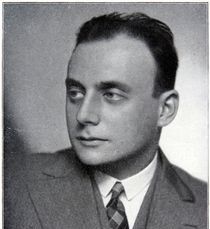Erich Kohnke
Erich Kohnke was the husband of Edith Frank's acquaintance Helene Leyens.
Erich Kohnke was born in Berlin, the son of textile merchant Emil Kohnke and Bianka Kohnke-Krause. He studied music in Berlin and Munich and was appointed Kapellmeister at the Chemnitz Opera in August 1926. He also directed the synagogue choir of the Jewish community in Chemnitz.[1] On 26 July 1926, he had married Lotte Bendix (1902-1967), from a Jewish merchant family in Münster . Following the Nazis power take-over in 1933, Kohnke was dismissed by the Chemnitz city council. In 1934, the Kohnke couple emigrated to the Netherlands, initially settling in The Hague and moving to Amsterdam in October 1935. In 1937 they left for Münster where Lotte Bendix, as sole heir, had to handle the sale of a large estate. In the end, the marriage between Erich Kohnke and Lotte Bendix did not last: it was dissolved on 2 September 1938, and a month later Kohnke returned to The Hague, where he met Helene (Leni) Leyens. On 3 January 1940, he married her, and on 25 December 1940, their daughter Anneke was born in Hilversum. In Hilversum, the family lived with Erich's stepmother Henriette Kohnke-Krause[2] and Leni's mother Klara Leyens, who had sought refuge with her daughter in the Netherlands after the November Progrom of 1938.[3]
After the forced relocation of the Hilversum Jews to Amsterdam, Erich, Leni and their daughter Anneke found refuge with the Frank family on Merwedeplein in May 1942.[4] According to Otto Frank, Helene Kohnke-Leyens was a good friend of Edith.[5] The Kohnke family is mentioned several times by Anne. For her 13th birthday, Anne received from Leni the book Daisy's bergvacantie (Daisy's mountain holiday) as a gift and “a bracelet from Anneke with a kiss” and a "book from Mr. Kohnke."[6]
After the Frank family went into hiding on 6 July 1942, the Kohnkes were registered on 17 July 1942, at the address 50 Vossius Street upstairs.[7] In October 1942, Anne wrote in her diary that the Kohnke family had gone into hiding.[8] In January 1943, the Jewish Council requested Kohnke to disclose his "current address".[9] However, the Kohnkes were tracked down, interned at Westerbork transit camp, deported and murdered in Auschwitz on 23 September 1943.[10] Erich's stepmother and mother-in-law met with the same fate.[11]
Daughter Anneke survived the war. Her parents had managed to get her to go into hiding in time. They had entrusted Anneke to the young student Cora de Jong, who worked in the resistance and who handed the child over to the Christian Blacquière family in Voorburg, near The Hague, on the same day. In the summer of 1945, Otto Frank found out that Anneke Kohnke was still alive. As there was no sign of her parents, he tried to get in touch with her mother's brother in Switzerland.[5] With the help of Otto, she emigrated to New York in 1946 to stay with her uncle Erich Leyens.[12] Since then, Anneke lives in the United States. A documentary was made about her, entitled The baby, which premiered at the International Documentary Filmfestival Amsterdam in 2012.[13]
Kohnke's first wife Lotte managed to escape to England via Switzerland. Like her divorced husband, she was stripped of her German citizenship in 1941, and after eight years as a stateless person, she was granted British citizenship in 1949.[1] She died in 1967.[14]
Source personal data.[15] Addresses: Stieltjesstraat 8, Hilversum.[7] Merwedeplein 37 II, Amsterdam (May '42).[5] Vossiusstraat 50 boven (17 July 1942).[7]
Footnotes
- a, b Gisela Möllenhoff: Erich Kohnke, in: Claudia Maurer Zenck, Peter Petersen (Hrsg.), Lexikon verfolgter Musiker und Musikerinnen der NS-Zeit, Hamburg: Universität Hamburg, 2010.
- ^ Stadsarchief Amsterdam (SAA), Dienst Bevolkingsregister, Archiefkaarten (toegangsnummer 30238): Archiefkaart H. Krause.
- ^ Rudolf Haffner, 'Helene Leyens - geboren in 1930 in Wesel, ermordet 1943 in Auschwitz', in: Christiane E. Müller & Wolfgang Jung (Red.), Juden in Wesel und am Niederrhein: eine Spurensuche, Wesel: Jüdisch-Christlicher Freundenkreis Wesel e.V. in zsarb. mit der Stadt Wesel, 2014, p. 311-321.
- ^ Arolsen Archives - International Center on Nazi Persecution, Bad Arolsen, Joodse Raad Cartotheek, DocID: 130321513 (Erich KOHNKE).
- a, b, c Anne Frank Stichting, Anne Frank Collectie, Otto Frank Archief, reg. code OFA_72: Otto Frank aan ‘Meine Lieben’, 11 augustus 1945.
- ^ Anne Frank, Diary Version A, 14 June 1942, in: The Collected Works, transl. from the Dutch by Susan Massotty, London [etc.]: Bloomsbury Continuum, 2019.
- a, b, c SAA, Dienst Bevolkingsregister, Archiefkaarten (toegangsnummer 30238): Archiefkaart E. Kohnke.
- ^ Anne Frank, Diary Version A, 16 October 1942, in: The Collected Works. For her thirteenth birthday, Anne received a book from "Mr Kohnke". Diary Version A, 14 June 1942.
- ^ Het Joodsche Weekblad, 1 januari 1943.
- ^ Joods Monument: Erich Kohnke; Joods Monunment: Helene Leni Kohnke-Leyens
- ^ Joods Monument: Sara Leyens-Levenbach; Henriette Kohnke-Krause.
- ^ Otto Frank speelde belangrijke rol bij adoptie baby, Het Parool, 10 november 2012. Voor Erich Leyens, zie Wikipedia: Erich Leyens.
- ^ IDFA Festival History: The baby; Wikipedia: De Baby.
- ^ Spuren im Vest - Juden im Vest Recklinghausen: Anna Bendix.
- ^ SAA, Dienst Bevolkingsregister, Archiefkaarten (toegangsnummer 30238): Archiefkaart E. Kohnke; Joods Monument: Erich Kohnke.
